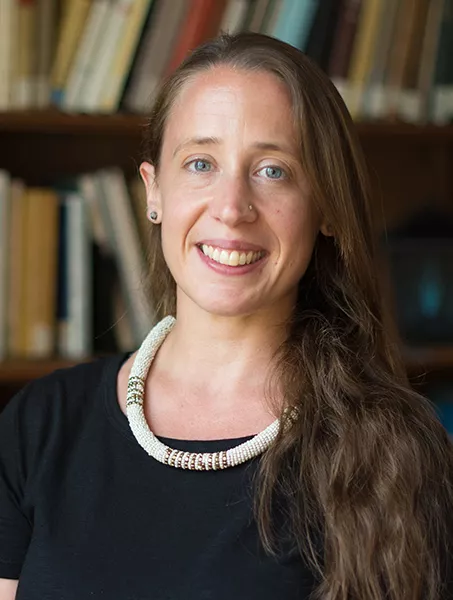
Assistant Professor of Classical and Near Eastern Archaeology Jennie Bradbury led a discussion titled "The Remembered Dead" as part of the fall 2018 semester Friday Finds series. For the semester, the series featured talks related to "ear-whispered: works by Tania El Khoury."
The discussion focused on the history of how humans interact with the dead, including how mortuary beliefs and practices have changed over time and cultures, and both the preservation of memory and the deliberate invisibility of the dead in the ancient Near East.
"What is a 'proper burial' or a 'good death'?" Bradbury posed this question at the beginning of the talk and used it to lead into a discussion about where the idea of a proper burial stemmed from, what could be considered a proper burial, and about modern-day (and future) burials.
Bradbury also talked about her own work with The Invisible Dead Project. Based at Durham University in the United Kingdom and funded by the John Templeton Foundation, this project looked at archaeological data from Britain and the Near East encompassing the Neolithic to the Roman period. It brought together many different specialists, such as a bioarchaeologist, a theologian, and others to explore the ideas of burial, memory, and religion and their development within society.
"We were trying to do a kind of cross-comparison to see: 'Can we see similar types of peaks and troughs in the burial record over time in these two very, very different places?' And that obviously had immense challenges, bringing together evidence from such diverse regions," Bradbury said about The Invisible Dead Project.
Bradbury's first fieldwork was done in Syria, from 2005 to 2010. She has since worked in many countries in the Middle East, such as Lebanon, Jordan, and Kuwait. Working in Syria was also one of the reasons she wanted to participate in the Tania El Khoury program. She attended the Garden Speaks exhibition several times and mentioned it was especially poignant for her, as she had been in Syria before the conflict
"The first place in which you shape yourself as an archaeologist, while it might not remain your favorite, it will still have that very special place in your heart," she says.
In the spring, Bradbury is teaching the graduate level course Interrogating the Dead and a senior seminar titled Endangered Archaeology. She also has more lectures to look forward to: one in February as part of the Archaeological Institute of America lecture series in Philadelphia and one in March to master’s students at the University of Pennsylvania.